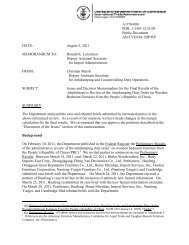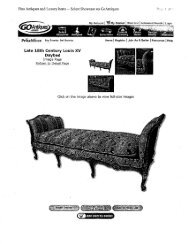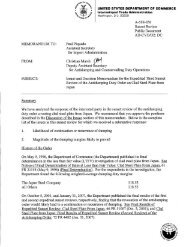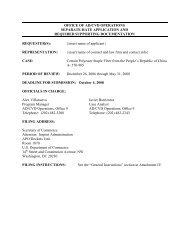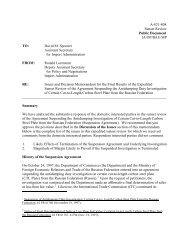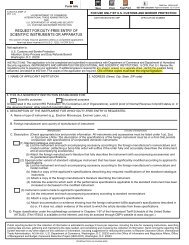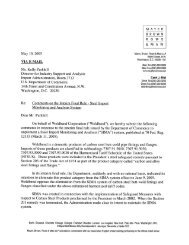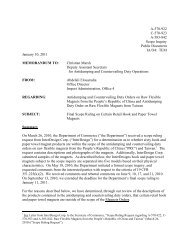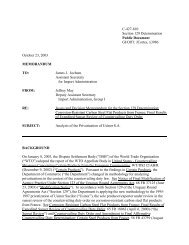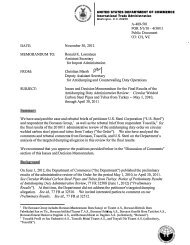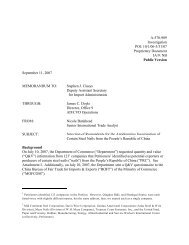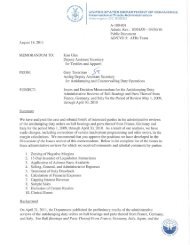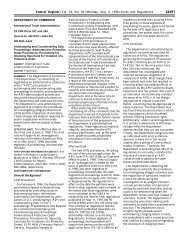Stainless Steel Bar from India - Import Administration - Department ...
Stainless Steel Bar from India - Import Administration - Department ...
Stainless Steel Bar from India - Import Administration - Department ...
Create successful ePaper yourself
Turn your PDF publications into a flip-book with our unique Google optimized e-Paper software.
DATE: September 4, 2007<br />
MEMORANDUM TO: David M. Spooner<br />
Assistant Secretary<br />
for <strong>Import</strong> <strong>Administration</strong><br />
FROM: Stephen J. Claeys<br />
Deputy Assistant Secretary<br />
for <strong>Import</strong> <strong>Administration</strong><br />
A-533-810<br />
2005/2006 Administrative Review<br />
POR: 02/01/05-01/31/06<br />
Public Document<br />
Office 1: S. Holland<br />
SUBJECT: Issues and Decision Memorandum for the 2005/2006 Antidumping<br />
Duty Administrative Review of <strong>Stainless</strong> <strong>Steel</strong> <strong>Bar</strong> <strong>from</strong> <strong>India</strong><br />
SUMMARY<br />
We have analyzed the case and rebuttal briefs of interested parties in the 2005/2006 administrative<br />
review of stainless steel bar <strong>from</strong> <strong>India</strong>. As a result of our analysis, we have made changes to the<br />
preliminary results<br />
. Below is a complete list of the issues in this review for which we received<br />
comments and rebuttals <strong>from</strong> interested parties:<br />
General Comments<br />
Comment 1: Application of Review-Specific Rate to Non-Reviewed Companies<br />
Treatment of Sales Made Above Normal Value<br />
Comments Relating to Bhansali Bright <strong>Bar</strong>s Pvt. Ltd.<br />
Comment 3: Treatment of DEPB Application Charges<br />
Comment 4: Comment on Verification: Correct Payment Date<br />
Comment 5: Comment on Verification: Correct Gross Unit Price<br />
Comment 6: Inclusion of Implied Interest on Non-Interest Bearing Loans<br />
Comment 7: Calculation of Home Market Imputed Credit Expenses<br />
Comment 8: Treatment of Billing Adjustments<br />
Comments Relating to Venus Wire Industries Pvt. Ltd.
Comment 9: Calculation of Home Market Imputed Credit Expenses<br />
BACKGROUND<br />
On March 7, 2007, the <strong>Department</strong> of Commerce (“the <strong>Department</strong>”) published in the Federal<br />
Register the preliminary results of the 2005/2006 administrative review of the antidumping duty order<br />
on stainless steel bar (“SSB”) <strong>from</strong> <strong>India</strong>. 1 The period of review (“POR”) is February 1, 2005, through<br />
January 31, 2006. We invited interested parties to comment on the Preliminary Results.<br />
On July 31, 2007, the <strong>Department</strong> received case briefs <strong>from</strong> Carpenter Technology Corporation,<br />
Crucible Specialty Metals, a division of Crucible Materials Corporation, Electralloy Company, North<br />
American <strong>Stainless</strong>, Universal <strong>Stainless</strong>, and Valbruna Slater <strong>Stainless</strong> (collectively, the “petitioners”);<br />
and Bhansali Bright <strong>Bar</strong>s Pvt. Ltd. (“Bhansali”). On August 2, 2007, the <strong>Department</strong> rejected the case<br />
brief filed by Bhansali due to the submission of new, untimely filed information. 2 Bhansali submitted a<br />
revised case brief on August 4, 2007. On August 6, 2007, Bhansali submitted a rebuttal brief. On<br />
August 10, 2007, the petitioners, and interested parties Facor <strong>Steel</strong>s, Ltd. (“Facor”) and Mukand Ltd.<br />
(“Mukand”) filed rebuttal briefs.<br />
DISCUSSION OF ISSUES<br />
General Comments<br />
Comment 1: Application of Review-Specific Rate to Non-Reviewed Companies<br />
Petitioners’ Arguments: The petitioners argue that the <strong>Department</strong> should not apply a review-specific<br />
average rate to respondents that either requested a review, or for whom a review was requested by<br />
petitioners, but that the <strong>Department</strong> did not individually review. In particular, the petitioners object to<br />
applying a review-specific average rate to companies that have been found in past reviews to be<br />
uncooperative and, thus, have been assigned a rate based upon adverse facts available.<br />
The petitioners claim that the <strong>Department</strong>’s application of the review-specific average rate in this review<br />
is absurd because the circumstances are vastly different <strong>from</strong> other instances where the <strong>Department</strong><br />
applied this policy. The petitioners note that for the Preliminary Results, the <strong>Department</strong> cited to Notice<br />
of Preliminary Results of Antidumping Duty Administrative Review and Partial Rescission: Certain<br />
Softwood Lumber Products From Canada, 70 FR 33,063, 33,064 (June 7, 2005) (“Softwood<br />
1 See Notice of Preliminary Results of Antidumping Duty Administrative Review, Intent to Rescind and<br />
Partial Rescission of Antidumping Duty Administrative Review: <strong>Stainless</strong> <strong>Steel</strong> <strong>Bar</strong> <strong>from</strong> <strong>India</strong>, 72 FR 10151 (March<br />
7, 2007) (“Preliminary Results”).<br />
2007.<br />
2 See Letter <strong>from</strong> Brandon Farlander, Program Manager, to Bhansali Bright <strong>Bar</strong>s Pvt. Ltd., dated August 2,<br />
2
Lumber”). The petitioners argue that in Softwood Lumber, the <strong>Department</strong> received requests for<br />
review for over 400 companies and, of that number, it chose the eight largest exporters/producers. By<br />
comparison, the petitioners note that in this case reviews were requested for only eight companies and<br />
the <strong>Department</strong> choose two. Furthermore, the petitioners assert that the two companies selected by<br />
the <strong>Department</strong> were not necessarily the largest of the group and three of the companies that benefitted<br />
<strong>from</strong> the review-specific rate policy are among the largest exporter/producers of stainless steel bar.<br />
According to the petitioners, the other cases in which the <strong>Department</strong> has applied the review-specific<br />
rate to non-reviewed companies are likewise distinguished by the sheer number of companies involved,<br />
and there is no question that the <strong>Department</strong> cannot examine each and every one. The petitioners<br />
further contend that because the <strong>Department</strong> declined to fully verify the two mandatory respondents, it<br />
is irresponsible for the <strong>Department</strong> to apply a weighted-average of their rates to other companies.<br />
The petitioners claim that the <strong>Department</strong>’s application of a review-specific weighted-average rate to all<br />
non-reviewed respondents in this review also is contrary to the <strong>Department</strong>’s policy itself. The<br />
petitioners state that the <strong>Department</strong> has said that in calculating the weighted-average rate, it will<br />
exclude any company rates that are de minimis or margins determined entirely on adverse facts<br />
available (“AFA”). The petitioners argue that the apparent purpose of excluding the AFA margins <strong>from</strong><br />
the weighted-average is because it would be unfair to impose on non-reviewed respondents margins<br />
based on uncooperative respondents’ behavior. Similarly, petitioners point out that this policy would<br />
also give non-reviewed respondents an unfair benefit if zero or de minimis margins were included in the<br />
average. According to the petitioners, in this review, the <strong>Department</strong>’s application of the weightedaverage<br />
rate to respondents such Mukand, Isibars, and Facor does precisely what the policy attempts<br />
to avoid, it gives each of these companies a benefit.<br />
The petitioners suggest that for the final results the <strong>Department</strong> should consider two different<br />
approaches with respect to the margins assigned to the six non-mandatory respondents: 1) the reviewspecific<br />
weighted-average rate should not be applied to any company that previously received a<br />
company-specific rate or alternatively, 2) the <strong>Department</strong> should not apply any new rate to a nonreviewed<br />
respondent when that respondent’s current rate is based on adverse facts available.<br />
Mukand and Facor’s Arguments: In their rebuttal brief, Mukand and Facor argue that the <strong>Department</strong><br />
should continue to assign the review-specific weighted-average rate to the non-selected respondents, as<br />
it did in the Preliminary Results.<br />
Mukand and Facor assert that the petitioners’ arguments are misguided. First, Mukand and Facor<br />
argue that the statute does not limit the <strong>Department</strong>’s authority to sample to situations where there is<br />
overriding evidence that the <strong>Department</strong> cannot review each respondent. According to Mukand and<br />
Facor, the statute permits the <strong>Department</strong> not to examine each and every respondent when “it is not<br />
practical to do so...because of the large number of exporters and producers.” Mukand and Facor<br />
assert that whether there is a “large number” of producers should be evaluated based upon both the<br />
<strong>Department</strong>’s resources and the import volumes and value of the case. Moreover, Mukand and Facor<br />
3
argue that what constitutes a “large number” can vary <strong>from</strong> case to case, based upon the circumstances.<br />
According to Mukand and Facor, the <strong>Department</strong> did allocate its available resources reasonably.<br />
Second, Mukand and Facor assert that the petitioners’ claim that the <strong>Department</strong> did not select the<br />
largest companies for review in this case is erroneous and unsupported. Third, with respect to the<br />
petitioners’ argument that Mukand and Facor should not receive review-specific rates because the<br />
<strong>Department</strong> failed to conduct full verifications, Mukand and Facor argue that there is no statutory<br />
requirement for the <strong>Department</strong> to conduct verifications in this review. Fourth, with respect to the<br />
petitioners’ argument that it is unfair to assign the review-specific rate to companies previously found to<br />
be uncooperative, Mukand and Facor argue that the <strong>Department</strong> has a long-standing policy of treating<br />
each review as a separate matter and not faulting respondents for events <strong>from</strong> prior reviews.<br />
With respect to the petitioners’ proposed revisions to the review-specific rate applied in this review,<br />
Mukand and Facor assert that both proposals lack merit and would deny the affected respondents the<br />
right to an administrative review. Citing to section 751(a)(1)(B) of the Tariff Act of 1930, as amended<br />
(“the Act”), Mukand and Facor claim that the <strong>Department</strong> is required to “review, and determine...the<br />
amount of any antidumping duty” for a respondent that has requested an administrative review.<br />
Moreover, according to Mukand and Facor, the <strong>Department</strong> does review and determine the amount of<br />
any antidumping duty when it assigns the review-specific margin to non-mandatory respondents.<br />
However, Mukand and Facor claim that the <strong>Department</strong> would not “review and determine” the amount<br />
of any antidumping duty for non-mandatory respondents if, as the petitioners propose, it merely left a<br />
pre-existing rate unchanged because such respondents already had received a company-specific rate in<br />
prior reviews.<br />
Mukand and Facor argue that the petitioners’ second proposal of maintaining adverse facts available<br />
rates for a non-reviewed respondent such as Mukand is contrary to the statute. Citing section 776(b)<br />
of the Act, Mukand and Facor claim that the <strong>Department</strong> may apply adverse inferences to a<br />
respondent only if the administering authority finds that an interested party failed to cooperate by not<br />
acting to the best of its ability to comply with a request for information <strong>from</strong> the <strong>Department</strong>.<br />
According to Mukund and Facor, Mukand has cooperated fully with the <strong>Department</strong>’s request for<br />
information and has acted to the best of its ability during this review. Therefore, citing to sections<br />
776(b) and 751 of the Act, Mukand and Facor claim that there is no statutory basis for the application<br />
of adverse facts available under these circumstances.<br />
<strong>Department</strong>’s Position: We have not adopted the petitioners’ argument that a review-specific rate<br />
should not be applied in this case. It is the <strong>Department</strong>’s normal practice to calculate a review-specific<br />
weighted-average rate (excluding any de minimis margins or margins determined entirely on adverse<br />
facts available) for the companies requesting a review, but not selected for individual examination. See,<br />
e.g., Notice of Final Results of Antidumping Duty Administrative Review: Certain Softwood Lumber<br />
Products <strong>from</strong> Canada, 70 FR 73437, 73442 (December 12, 2005); Certain Fresh Cut Flowers <strong>from</strong><br />
Colombia: Final Results and Partial Rescission of Antidumping Duty Administrative Review, 62 FR<br />
53287, 53289 (October 14, 1997) (“Flowers”); Honey <strong>from</strong> Argentina: Preliminary Results of<br />
4
Antidumping Duty Administrative Review and Intent Not to Revoke in Part, 71 FR 78397, 78402<br />
(December 29, 2007) (unchanged for the final results; Honey <strong>from</strong> Argentina: Final Results of<br />
Antidumping Duty Administrative Review and Determination Not to Revoke In Part, 72 FR 25245<br />
(May 4, 2007)).<br />
While petitioners are correct that the cases cited by the <strong>Department</strong> in the Preliminary Results involved<br />
significantly more potential respondents than this review, there is nothing in the statute that limits<br />
respondent selection to reviews involving hundreds of respondents. Section 777A(c)(1) of the Act,<br />
directs the <strong>Department</strong> to calculate individual weighted-average dumping margin for each<br />
exporter/producer of the subject merchandise unless it is not practicable to do so. According to section<br />
777A(c)(2) of the Act:<br />
If it is not practicable to make individual weighted average dumping margin<br />
determinations...because of the large numbers of exporters or producers involved in the<br />
investigation or review, the administrating authority may determine the weighted average<br />
dumping margin for a reasonable number of exporters or producers by limiting its<br />
examination to: (A) a sample of exporters, producers, or types of products that is<br />
statistically valid based on the information available to the administering authority at the<br />
time of selection, or (B) exporters and producers accounting for the largest volume of<br />
the subject merchandise <strong>from</strong> the exporting country that can be reasonably examined.<br />
For the reasons explained in our respondent selection memorandum, resource constraints<br />
prevented us <strong>from</strong> conducting individual reviews of more than two companies. See<br />
Memorandum <strong>from</strong> Scott Holland to Susan H. Kuhbach, Senior Office Director, “<strong>Stainless</strong><br />
<strong>Steel</strong> <strong>Bar</strong> <strong>from</strong> <strong>India</strong>: Respondent Selection,” dated June 7, 2006, (“Respondent Selection<br />
Memorandum”).<br />
Moreover, there are several cases where the <strong>Department</strong> has limited the number of<br />
respondents to be examined where the total number of potential respondents was comparable<br />
to the number in this review. See Notice of Preliminary Determination of Sales at Less Than<br />
Fair Value and Postponement of Final Determination: Carbon and Certain Alloy <strong>Steel</strong> Wire<br />
Rod <strong>from</strong> Brazil, 67 FR 18165, 18167 (April 15, 2002) (unchanged for the final results; see<br />
Notice of Final Determination of Sales at Less Than Fair Value and Final Negative Critical<br />
Circumstances: Carbon and Certain Alloy <strong>Steel</strong> Wire Rod <strong>from</strong> Brazil 67 FR 55792 (August<br />
30, 2002)); where the petitioners identified four producers and the <strong>Department</strong> selected one of<br />
two producers that had shipments to the United States as mandatory respondents. See also,<br />
Notice of Preliminary Determination of Sales at Less Than Fair Value and Postponement of<br />
Final Determination: Carbazole Violet Pigment 23 From <strong>India</strong>, 69 FR 35293 (June 24, 2004)<br />
(unchanged for the final results; see Notice of Amended Final Determination of Sales at Less<br />
Than Fair Value and Antidumping Duty Order: Carbazole Violet Pigment 23 From <strong>India</strong>, 69<br />
FR 35293 (June 24, 2004)); where the petitioners identified 12 producers and the <strong>Department</strong><br />
5
selected two of the four producers that had shipments to the United States as mandatory<br />
respondents.<br />
With respect to the petitioners’ assertion that the <strong>Department</strong> should not apply the reviewspecific<br />
rate because the <strong>Department</strong> “declined to fully examine even the two companies <strong>from</strong><br />
which it requested information,” we disagree. Although the <strong>Department</strong> elected not to verify<br />
the cost response of Venus, we conducted a successful on-site verification of Bhansali’s sales<br />
and cost responses, and Venus’ sales response. We further note that neither verification was<br />
required under 782(i) of the Act.<br />
With respect to petitioners’ claim that the selected respondents are not the largest producers<br />
and that three of the non-selected companies are among the largest exporters/producers of<br />
SSB, we agree with Mukand and Facor that no support has been provided for the claim. As<br />
explained in our respondent selection memorandum, of the companies for which a review was<br />
requested, Bhansali and Venus are the two exporters accounting for the largest quantity and<br />
value of exports to the United States during the POR. Moreover, Bhansali and Venus<br />
accounted for over eighty percent of the total reported quantity and value of imports of the<br />
subject merchandise <strong>from</strong> these companies to the United States during the POR. See<br />
Respondent Selection Memorandum at 4.<br />
Finally, the petitioners were on notice nine months before the publication of the Preliminary Results of<br />
the <strong>Department</strong>’s intentions with respect to assigning a review-specific rate to non-selected<br />
respondents:<br />
In cases where the <strong>Department</strong> has limited its examination of requested companies, the<br />
<strong>Department</strong> has based the dumping margins for companies that requested a review, or<br />
for which a review was requested, and which complied with any request for<br />
information <strong>from</strong> the <strong>Department</strong>, but were not individually examined, on the weightedaverage<br />
dumping margins found for those companies that were examined (see, e.g.,<br />
Flowers).<br />
See Respondent Selection Memorandum at 3. No objections to this method for assigning a rate to<br />
non-selected respondents was made until after the publication of the Preliminary Results.<br />
For the reasons explained above, we are not persuaded that the <strong>Department</strong> should deviate <strong>from</strong> its<br />
policy of applying the review-specific rate to non-selected companies. We agree with Mukand and<br />
Facor that the statute directs the <strong>Department</strong> to review, and to determine the amount of any<br />
antidumping duty for respondents that have requested administrative reviews. See section 751(a)(1)(B)<br />
of the Act. Furthermore, Mukand and Isibars have cooperated fully in this review and have acted to<br />
the best of their abilities in their responses to the <strong>Department</strong>’s requests for information. Moreover,<br />
6
there is no basis to maintain AFA rates under 776(b) of the Act. Therefore, consistent with the<br />
Preliminary Results, we are continuing to apply the review-specific average rate to the non-selected<br />
respondents.<br />
3 Agreement on Implementation of Article VI of the General Agreement on Tariffs and Trade (“GATT”) 1994<br />
(“Antidumping Agreement”).<br />
Treatment of Sales Made Above Normal Value<br />
Bhansali’s Arguments: Bhansali asserts that the <strong>Department</strong>'s practice of setting sales with negative<br />
margins to zero (“zeroing”) in the calculations of overall dumping percentages violates a ruling made in<br />
January 2007 by the Appellate Body (“AB”) of the World Trade Organization (“WTO”). According<br />
to Bhansali, the AB found in United States - Measures Related to Zeroing and Sunset Reviews, Report<br />
of the Appellate Body, WT/DS322/AB/R, (December 14, 2006) (adopted January 23, 2007) (“U.S. -<br />
Zeroing (Japan)”), that zeroing in administrative reviews is inconsistent with Articles 2.4 and 9.3 of the<br />
Antidumping Agreement 3 and Article VI:2 of the GATT 1994 (no page citation). The respondents<br />
argue that, for the final results, the <strong>Department</strong> should recalculate the respondents’ margins without<br />
using the practice of zeroing.<br />
Petitioners’ Arguments: The petitioners assert that the courts have consistently upheld the<br />
<strong>Department</strong>’s practice of zeroing, despite WTO rulings finding that zeroing in various applications is<br />
contrary to the WTO antidumping agreement. Citing Timken Co. V. United States, 354 F.3d 1334,<br />
1342-43 (Fed. Cir.) (2004) (“Timken”), the petitioners note that the U.S. Court of Appeals for the<br />
Federal Circuit upheld the numerous decisions of the U.S. Court of International Trade (“CIT”)<br />
(including the pre-Uruguay Round Agreements Act (“URAA”) cases of Serampore Industries Pvt. Ltd.<br />
V. United States, 675 F. Supp. 1353 (CIT 1987) and Böwe Passat Reinigungsund Wäschereitechnik<br />
GmbH v. United States, 926 F. Supp.1138 (CIT 1996)) that have previously found the <strong>Department</strong>’s<br />
zeroing policy to be reasonable and in accordance with law. 4<br />
In particular, the petitioners point out that the court held that the <strong>Department</strong> reasonably interpreted 19<br />
U.S.C. § 1677(35)(A), which defines dumping margin as “the amount by which the normal value<br />
exceeds the export price or constructed export price of subject merchandise,” as allowing for zeroing in<br />
administrative reviews. 5 The petitioners claim that the CIT recently rejected the suggestion that recent<br />
WTO decisions required that the <strong>Department</strong> abandon its practice of zeroing, finding that “the Federal<br />
Circuit in {Timken} has: 1) expressly affirmed the reasonableness of the <strong>Department</strong>’s use of zeroing in<br />
an administrative review, and 2) concluded that WTO decisions are not binding on the United States<br />
and cannot trump domestic legislation.” See Corus Staal BV v. United States, Slip Op. 06-112 at 6<br />
4 See Timken at 1343.<br />
5 Id. at 1341-1343.<br />
7
(CIT, July 25, 2006) (citing Corus Staal BV v. United States, 387 F. Supp. 2d 1291, 1298 (CIT<br />
2005) aff’d Slip Op. 05-1600, 2006 U.S. App. LEXIS 15022 (Fed. Cir.) (June 13, 2006)).<br />
The petitioners argue that it is the <strong>Department</strong>’s and the court’s responsibility to interpret the U.S.<br />
antidumping statute, which necessarily often means “filing the gaps” that (U.S.) Congress has either<br />
deliberately or inadvertently left in the statutory regime. The petitioners further assert that the courts<br />
have long recognized that in light of the antidumping law’s inherent complexity, the <strong>Department</strong>’s<br />
attempts to interpret and apply the statute are entitled to special deference. See Smith-Corona Group<br />
v. United States, 713 F.2d 1568, 1571 (Fed. Cir.) (1983) (“The Secretary has broad discretion in<br />
executing the {antidumping}law.”). Citing to <strong>Stainless</strong> <strong>Steel</strong> Sheet and Strip in Coils <strong>from</strong> Mexico:<br />
Final Results of Antidumping Duty Administrative Review, 70 FR 3677 (January 26, 2005), and the<br />
accompanying Issues and Decision Memorandum at Comment 16, the petitioners argue that in<br />
interpreting the statute as a whole, the <strong>Department</strong> has long recognized that the statutory regime as a<br />
whole is best effectuated when negative margins of dumping are treated as non-dumped sales, but not<br />
allowed to cancel out positive margins. Accordingly, the petitioners contend that the <strong>Department</strong><br />
should continue using the zeroing methodology for the margin calculations of the respondents in the final<br />
results.<br />
<strong>Department</strong>’s Position: Section 771(35)(A) of the Act defines “dumping margin” as the “amount by<br />
which the normal value exceeds the export price and constructed export price of the subject<br />
merchandise” (emphasis added). Outside the context of antidumping investigations involving<br />
average-to-average comparisons, Commerce interprets this statutory definition to mean that a dumping<br />
margin exists only when normal value is greater than export or constructed export price. As no<br />
dumping margins exist with respect to sales where normal value is equal to or less than export or<br />
constructed export price, Commerce will not permit these non-dumped sales to offset the amount of<br />
dumping found with respect to other sales. The U.S. Court of Appeals for the Federal Circuit has held<br />
that this is a reasonable interpretation of the statute. See Timken Co. v. United States, 354 F.3d 1334,<br />
1342 (Fed. Cir.), cert. denied sub nom., Koyo Seiko Co. v. United States, 543 U.S. 976 (2004). See<br />
also Corus Staal BV v. <strong>Department</strong> of Commerce, 395 F.3d 1343, 1347 (Fed. Cir. 2005), cert.<br />
denied, 126 S. Ct. 1023, 163 L. Ed. 2d 853 (January 9, 2006).<br />
The <strong>Department</strong> notes it has taken action with respect to two WTO dispute settlement reports finding<br />
the denial of offsets to be inconsistent with the Antidumping Agreement: United States - Laws,<br />
Regulations and Methodology for Calculating Dumping Margins, Report of the Appellate Body,<br />
WT/DS294/AB/R, (Apr. 18, 2006) (adopted May 9, 2006) (“U.S. - Zeroing (EC),” (that zeroing in<br />
administrative reviews is inconsistent with Article 9.3 of the Antidumping Agreement) 6 and U.S. -<br />
Zeroing (Japan).<br />
6 U.S. - Zeroing (EC) Appellate Body Report at paragraph 135.<br />
8
With respect to US – Zeroing (EC), Commerce recently modified its calculation of the<br />
weighted-average dumping margin when using average-to-average comparisons in antidumping<br />
investigations. See Antidumping Proceedings: Calculation of the Weighted-Average Dumping Margin<br />
During an Antidumping Investigation; Final Modification, 71 FR 77722 (December 27, 2006). In<br />
doing so, Commerce declined to adopt any other modifications concerning any other methodology or<br />
type of proceeding, such as administrative reviews. See 71 FR at 77724. With respect to the specific<br />
administrative reviews at issue in that dispute, the United States has determined that each of those<br />
reviews has been superseded by a subsequent administrative review and the challenged reviews are no<br />
longer in effect.<br />
As such, the Appellate Body’s reports in US – Zeroing (EC) have no bearing on whether the<br />
<strong>Department</strong>'s denial of offsets in this administrative determination is consistent with U.S. law. See<br />
Corus Staal, 395 F.3d at 1347-49; Timken, 354 F.3d at 1342. Accordingly, the <strong>Department</strong> will<br />
continue in this case to deny offsets to dumping based on export transactions that exceed normal value.<br />
With respect to US – Zeroing (Japan), Congress has adopted an explicit statutory scheme for<br />
addressing the implementation of WTO dispute settlement reports. See 19 U.S.C. § 3538. As is clear<br />
<strong>from</strong> the discretionary nature of that scheme, Congress did not intend for WTO dispute settlement<br />
reports to automatically trump the exercise of the <strong>Department</strong>’s discretion in applying the statute. See<br />
19 U.S.C. § 3538(b)(4) (implementation of WTO reports is discretionary); see also SAA at 354 (“<br />
{a}fter considering the views of the Committees and the agencies, the Trade Representative may<br />
require the agencies to make a new determination that is ‘not inconsistent’ with the panel or Appellate<br />
Body recommendations. . . “). Because no change has yet been made with respect to the issue of<br />
“zeroing” in administrative reviews, the <strong>Department</strong> will continue with its current approach to calculating<br />
and assessing antidumping duties in this administrative review. For the reasons mentioned above, we<br />
have not changed our calculation for these final results.<br />
Comments Relating to Bhansali Bright <strong>Bar</strong>s Pvt. Ltd.<br />
Comment 3: Treatment of DEPB Application Charges<br />
Bhansali’s Arguments: Bhansali argues that the <strong>Department</strong> should not deduct the duty entitlement pass<br />
book (“DEPB”) application charges <strong>from</strong> the U.S. gross unit price, because the <strong>Department</strong> did not<br />
increase the U.S. gross unit price for duty drawback in the Preliminary Results.<br />
Petitioners’ Arguments: The petitioners contend that the consideration of the DEPB application charges<br />
is separate and distinct <strong>from</strong> the <strong>Department</strong>’s analysis of the duty drawback claim. The petitioners<br />
argue that the <strong>Department</strong>’s treatment of these expenses in the Preliminary Results is consistent with the<br />
<strong>Department</strong>’s definition of a direct expense in its standard questionnaire, the <strong>Department</strong>’s regulations,<br />
and Bhansali’s statements on the official record of this proceeding.<br />
9
The petitioners cite the <strong>Department</strong>’s standard questionnaire, which notes that direct selling expenses<br />
are typically variable expenses that are incurred as a direct and unavoidable consequence of the sale<br />
(i.e., in the absence of the sale these expenses would not be incurred). 7 The petitioners further point to<br />
Bhansali’s questionnaire responses where it states that the DEPB expenses are paid to the Government<br />
of <strong>India</strong> when applying for duty drawback and can be tied directly to a sale in the United States. 8 Thus,<br />
the petitioners assert that the <strong>Department</strong> should continue to make a downward adjustment for this<br />
expense pursuant to 772(c)(2)(A) of the Act.<br />
<strong>Department</strong>’s Position: We agree with the petitioners. In its questionnaire responses, Bhansali<br />
reported that it incurs a direct transaction-specific expense paid to the Government of <strong>India</strong> as the result<br />
of a sale to the United States. At verification, we reviewed documentation supporting the adjustment. 9<br />
Therefore, in accordance with 772(c)(2)(A) of the Act, the <strong>Department</strong> has continued to deduct DEPB<br />
application fees <strong>from</strong> the U.S. gross unit price for the final results.<br />
Comment 4: Comments on Verification: Clarification of Payment Date<br />
Bhansali’s Arguments: Bhansali claims that the bank documentation it provided at verification in<br />
support of the payment date for one U.S. sales observation was not printed properly and this error<br />
caused company officials to confirm the wrong payment date for the sale. 10 Consequently, according to<br />
Bhansali, the <strong>Department</strong>’s verification report incorrectly states that the reported payment date for the<br />
U.S. sale is wrong. Instead, according to Bhansali, the payment date originally reported in its sales<br />
listings is correct. In its case brief, Bhansali re-submitted a bank statement and a payment voucher<br />
originally reviewed by <strong>Department</strong> officials at verification.<br />
Petitioners’ Arguments: The petitioners argue that based upon the information contained in the<br />
documentation presented to officials at verification, the <strong>Department</strong> verified that the payment date was<br />
mis-reported in Bhansali’s U.S. sales listing. The petitioners assert that Bhansali did not explain in its<br />
case brief why the <strong>Department</strong> should ignore the payment date it verified, nor has Bhansali explained<br />
why the information contained in its case brief should trump the verification findings.<br />
7 See the <strong>Department</strong>’s Standard Questionnaire at I-127.<br />
8 See Supplemental Sections B-C Response, (December 8, 2006), at 24 (“Bhansali SQR”).<br />
9 See Memorandum to the File, “Verification of the Sales and Cost Responses of Bhansali Bright <strong>Bar</strong>s Pvt.<br />
Ltd. in the 2005/2006 Antidumping Duty Administrative Review of <strong>Stainless</strong> <strong>Steel</strong> <strong>Bar</strong> <strong>from</strong> <strong>India</strong>,” dated July 24,<br />
2007, (“Verification Report - Bhansali”), at Verification Exhibit VE-14, at 56-58.<br />
10 Verification Report - Bhansali, at 19; and at VE-14, at 44.<br />
10
<strong>Department</strong>’s Position: The <strong>Department</strong> agrees with Bhansali. At verification, Bhansali presented<br />
evidence of the payment for the U.S. sale, including a payment voucher and Bhansali’s bank statement<br />
for the payment date in question. 11 The <strong>Department</strong> noted in its verification report that there was an<br />
error in the reporting of the payment date for the sale in question. However, the re-submitted bank<br />
statement in Bhansali’s case brief clearly shows when Bhansali had access to the funds and that date<br />
corresponds to the payment voucher, which is the date reported to the <strong>Department</strong> before verification.<br />
Therefore, we find that our verification report is in error and that the date Bhansali originally reported in<br />
its sales database is correct. Thus, no change is required to the payment date for this sale.<br />
Comment 5: Comments on Verification: Correct Gross Unit Price for Home Market Sale<br />
Bhansali’s Arguments: Bhansali disputes information contained in the verification report that it<br />
misreported the gross unit price for one home market sale invoice. 12 Bhansali contends that the error<br />
for the invoice in question had already been clarified by Bhansali in a supplemental questionnaire<br />
response submitted to the <strong>Department</strong>. 13<br />
Petitioners’ Arguments: The petitioners did not comment on this issue.<br />
<strong>Department</strong>’s Position: The <strong>Department</strong> agrees with Bhansali. We confirmed that information<br />
submitted by Bhansali in its questionnaire responses supports the gross unit prices for the home market<br />
sales observations in question and that the prices were reported to the <strong>Department</strong> correctly.<br />
Therefore, no adjustments are necessary for the final results.<br />
Comment 6: Inclusion of Implied Interest on Non-Interest Bearing Loans<br />
Bhansali’s Arguments: Bhansali argues that the <strong>Department</strong> should not have imputed interest on the<br />
company’s loans <strong>from</strong> shareholders and directors.<br />
Petitioners’ Arguments: The petitioners assert that the <strong>Department</strong> should not change its calculation of<br />
implied interest accrued on non-interest bearing loans because Bhansali has not presented any<br />
information in its case brief that would warrant a change in the <strong>Department</strong>’s findings on these loans at<br />
the Preliminary Results.<br />
<strong>Department</strong>’s Position: Bhansali had several outstanding loans <strong>from</strong> directors and other affiliated<br />
shareholders during the fiscal year 2005-2006, which did not accrue interest. For the Preliminary<br />
11 Id.<br />
12 See Verification Report - Bhansali at 14; and at VE-5, at 4.<br />
13 See Bhansali SQR at 35-36.<br />
11
Results, we computed the implied interest accruable for these loans during the period as required by<br />
section 773(f)(2) of the Act, the “Transaction Disregarded Rule.” 14 As the implied interest rate, we<br />
used the average interest rate Bhansali paid on similar unsecured loans which were outstanding during<br />
the same period using Bhansali’s most recently audited financial statements. We included the implied<br />
interest for these affiliated-party loans in Bhansali’s financial expense ratio. We note that Bhansali did<br />
not submit timely information on the record that would support a re-calculation of Bhansali’s financial<br />
expense ratio. Therefore, for these final results, we have continued to use an implied interest rate to<br />
calculate Bhansali’s interest expense on these non-interest bearing loans <strong>from</strong> shareholders and<br />
directors.<br />
Comment 7: Calculation of Home Market Credit Expenses<br />
Bhansali’s Arguments: Bhansali states that the <strong>Department</strong> should revise its calculation of home market<br />
imputed credit expense for the final results. Without citation, Bhansali claims that the correct calculation<br />
of imputed credit expense should include taxes (i.e., value-added taxes (“VAT”) and excise taxes) and<br />
indirect expenses such as freight expenses and insurance. Moreover, according to Bhansali, credit cost<br />
is the cost of total credit given to the customer on a particular sale (i.e., the total invoice value).<br />
Petitioners’ Arguments: According to the petitioners, pursuant to section 773(A), the <strong>Department</strong><br />
requires respondents to report the sale price, discounts, rebates and all other revenues and expenses<br />
net of taxes rebated or not collected when the product is exported. Therefore, the petitioners argue<br />
that the <strong>Department</strong> should deny Bhansali’s request that home market credit expenses should be<br />
recalculated inclusive of taxes for the final results.<br />
<strong>Department</strong>’s Position: It is the <strong>Department</strong>’s longstanding practice to calculate imputed credit based<br />
on the price net of taxes, freight, and insurance. See, e.g., Certain Cut-to-Length Carbon <strong>Steel</strong> Plate<br />
<strong>from</strong> Brazil: Final Results of Antidumping Duty Administrative Review, 63 FR 12744, 12747-48<br />
(March 16, 1998); Notice of Final Determination of Sales at Less than Fair Value; Certain Hot-Rolled-<br />
Flat-Rolled Carbon-Quality <strong>Steel</strong> Products <strong>from</strong> Brazil, 64 FR 38756, 38772-73 (July 19, 1999). As<br />
explained in these decisions, there are varying opportunity costs (or gains) associated with each of these<br />
expenses depending on when the payment for them is made. To account properly for these opportunity<br />
costs would impose an unreasonable onerous burden on both the respondent and the <strong>Department</strong>.<br />
Therefore, although expenses such as taxes, freight, and insurance may be reflected in the invoice price<br />
(the amount charged by the seller and paid by the buyer), we do not include them when calculating the<br />
cost of extending credit to the purchases.<br />
Comment 8: Treatment of Billing Adjustments<br />
14 See Cost of Production and Constructed Value Adjustments for the Preliminary Results - Bhansali<br />
Bright <strong>Bar</strong>s Pvt. Ltd., (February 28, 2007).<br />
12
Petitioners’ Arguments: The petitioners argue that the <strong>Department</strong> should deny Bhansali’s claim for an<br />
adjustment to normal value for billing adjustments because Bhansali was unable to substantiate its claim<br />
at verification. Petitioners state that there were reporting errors for all of the sales examined by the<br />
<strong>Department</strong> for which billing adjustments had been claimed. Therefore, according to petitioners, the<br />
<strong>Department</strong> has not verified Bhansali’s reported billing adjustments.<br />
Petitioners argue that the <strong>Department</strong> has a longstanding practice of denying a claim for an adjustment<br />
where the <strong>Department</strong> cannot verify the claimed adjustment because the respondent failed to provide<br />
supporting evidence. See, e.g., Metal Calendar Slides <strong>from</strong> Japan: Final Determination of Sales at<br />
Less than Fair Value, 71 FR 36063 (June 23, 2006), and the accompanying Issues and Decision<br />
Memorandum at Comment 9 (“Metal Slides - Investigation”); (citing Final Results of Antidumping Duty<br />
Administrative Review: Polyvinyl Alcohol From Taiwan, 63 FR 32,810, 32,819 (June 16, 1998).<br />
Furthermore, petitioners argue that the <strong>Department</strong> has stated in previous cases that the burden of<br />
proof to substantiate the legitimacy of a claimed adjustment falls on the respondent party making that<br />
claim. Id. (citing Final Results of Antidumping Duty Administrative Review: Silicon Metal <strong>from</strong> Brazil,<br />
71 FR 7517 (Feb. 13, 2006) and the accompanying Issues and Decision Memorandum at Comment 4.<br />
Bhansali’s Arguments: Bhansali argues that the documentation reviewed by the <strong>Department</strong> clearly<br />
shows that Bhansali received reduced payments <strong>from</strong> customers and, therefore, billing adjustments<br />
were made on certain home market sales. 15 According to Bhansali, given the fact that the <strong>Department</strong><br />
verified the billing adjustments, the <strong>Department</strong> should not deviate <strong>from</strong> its calculations made for the<br />
Preliminary Results.<br />
<strong>Department</strong>’s Position: In the Preliminary Results, we re-classified billing adjustments reported for<br />
specific sales as bad debt expenses and treated them as indirect selling expenses. 16 However, at<br />
verification, we found that the billing adjustments were transaction-specific and, therefore, could be tied<br />
directly to home market sales. 17<br />
In contrast to the Metal Slides - Investigation, where the <strong>Department</strong> denied a claim for an adjustment<br />
because the respondent failed to provide any supporting evidence for the claimed adjustment, Bhansali<br />
substantiated its claim for billing adjustments at verification by providing supporting documentation<br />
including sales invoices and payment documentation. We also tied the credit for the adjustments to<br />
Bhansali’s accounting system. While we agree with the petitioners that the <strong>Department</strong> did find errors<br />
2007, at 2.<br />
15 See Verification Report - Bhansali, at VE- 8, 9, 10, and 11.<br />
16 Preliminary Results Calculation Memorandum for Bhansali Bright <strong>Bar</strong>s Pvt. Ltd., dated February 23,<br />
17 See Verification Report - Bhansali, at VE- 8, at 10.<br />
13
in the calculation of reported billing adjustments, the errors were the result of the inclusion of taxes in<br />
Bhansali’s per-unit calculation.<br />
For the final results, we are applying the reported billing adjustments on a transaction-specific basis<br />
and, therefore, deducting the per-unit amounts <strong>from</strong> the gross unit price. Furthermore, we are adjusting<br />
Bhansali’s reported billing adjustments downward to eliminate taxes.<br />
Comments Relating to Venus Wire Industries Pvt. Ltd.<br />
Comment 9: Calculation of Home Market Imputed Credit Expenses<br />
Petitioners’ Arguments: According to the petitioners, because Venus calculated its imputed credit<br />
expense based upon a gross-unit price inclusive of taxes, Venus’ methodology is unreasonably<br />
distortive. The petitioners argue that the <strong>Department</strong> should reject Venus’ claim for an adjustment for<br />
home market credit expenses because the <strong>Department</strong> could not verify Venus’ claim for this<br />
adjustment.<br />
The petitioners further argue that the <strong>Department</strong> cannot recalculate Venus’ home market credit<br />
expenses because at verification the <strong>Department</strong> additionally found that the payment dates were not<br />
properly reported for the sales examined. Petitioners also note that for certain sales reviewed, Venus<br />
had not been paid for significant periods of time, calling into question the validity of Venus’ reported<br />
dates of payment for all sales. 18<br />
Citing to Metal Slides - Investigation, the petitioners state that the <strong>Department</strong> will deny a claim for an<br />
adjustment where the <strong>Department</strong> cannot verify the claimed adjustment. Thus, for the final results, the<br />
<strong>Department</strong> should set home market credit expenses to zero.<br />
Venus’ Arguments: Venus did not comment on this issue.<br />
<strong>Department</strong>’s Position: We agree with petitioners, in part. At verification, we found that Venus<br />
reported imputed credit expenses based on its total sales accounts receivable figure. The sales values in<br />
this account included taxes. Thus, for the reasons explained in response to comment<br />
7, Venus' imputed credit for its home market sales was overstated.<br />
However, we disagree with the petitioners that the imputed credit cost cannot be recalculated. Venus<br />
originally reported as its payment date the date it records the customer's payments in its account, and<br />
18 See Memorandum to the File, “Verification of the Sales Responses of Venus Wire Industries Pvt. Ltd. in the<br />
2005/2006 Antidumping Duty Administrative Review of <strong>Stainless</strong> <strong>Steel</strong> <strong>Bar</strong> <strong>from</strong> <strong>India</strong>,” dated July 24, 2007,<br />
(“Verification Report - Venus”), at 18-19.<br />
14
not the date that the payment clears the bank and Venus has access to the funds. This is the<br />
misreported payment date that petitioners refer to in their comment.<br />
The difference between the reported date and the date Venus has access to the funds averages one-totwo<br />
days. Although the difference is minimal, we asked Venus to resubmit its sales database using the<br />
date it has access to the funds as the payment date, and to calculate imputed credit using the net-of-tax<br />
prices. This database was submitted on August 13 and we are<br />
using it for these final results.<br />
RECOMMENDATION<br />
Based on our analysis of the comments received, we recommend adopting all of the above positions<br />
and adjusting all related margin calculations accordingly. If these recommendations are accepted, we<br />
will publish the final results of this administrative review and the final weighted-average dumping margins<br />
for all firms reviewed in the Federal Register.<br />
AGREE _________ DISAGREE _________<br />
____________________________<br />
David M. Spooner<br />
Assistant Secretary<br />
for <strong>Import</strong> <strong>Administration</strong><br />
_____________________________<br />
Date<br />
15



